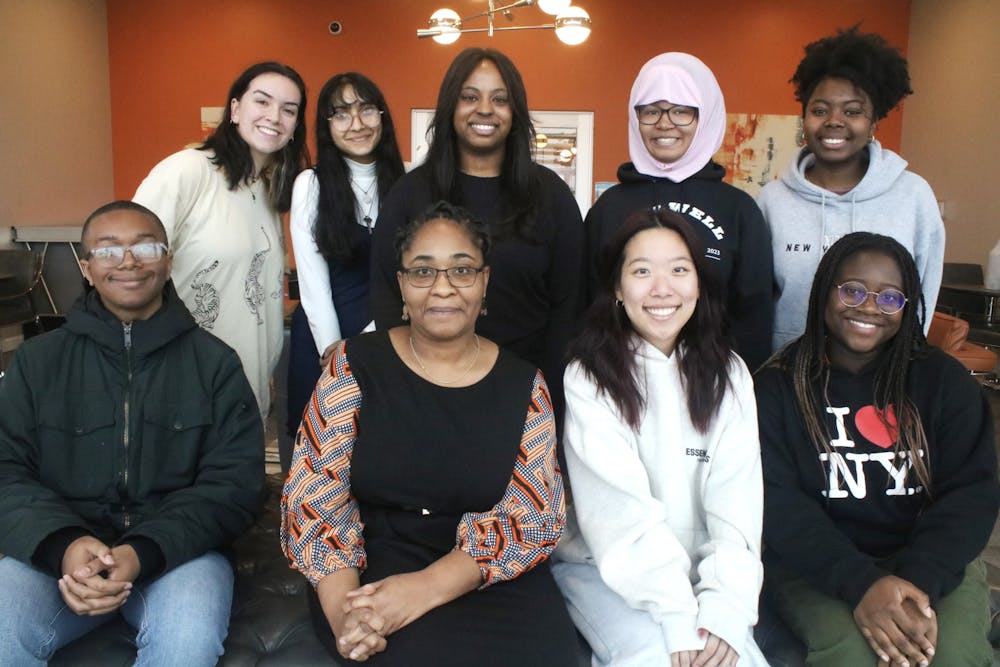Students in the global health department at Mercer University published their annual Global Health in Action (GHIA) newsletter titled “Modern Day Slavery: Trapped in Plain Sight.” The newsletter aims to educate the Macon community about the topic through research and storytelling.
Chinekwu Obidoa, PhD, associate professor of Global Health Studies and Africana Studies at Mercer, is the founder and faculty advisor of the GHIA Newsletter. She started producing the newsletters in 2016 to give students a chance to apply what they learned in the classroom and make a larger community impact.
According to Obidoa, if Mercer students want to make a difference in the world around them, the first step is education.
“We live on a campus where we are told that everyone majors in changing the world,” Obidoa said. “I have been one of the people who advocate that you cannot change a world you don’t know.”
The newsletter defines modern slavery as an umbrella term that includes sex trafficking, forced labor, bonded labor, domestic servitude, debt bondage and even child soldiers. According to their research, 50 million people trapped in slavery worldwide are linked to the production of goods and services we depend on daily.
Aaliyah Deen Sesay '24 was appointed to be the newsletter’s editor-in-chief, and she wrote multiple pieces in the newsletter. Writing and researching modern-day slavery brought up strong emotions in her, she said.
“A lot of it was anger, mainly because this is something that is so around us, it's so entrenched into our society, but you would never see it unless someone allows you to see it,” Sesay said.
Many of the other editors and contributors also felt a close connection to the stories they were writing about. Contributor Keslyn Billings ‘26 wrote a piece on the systemic trafficking of women and young girls.
“It makes you angry that these things happen, and people treat young girls like they are commodities and not real people,” Billings said.
She said it’s important to look out for the signs of potential sex trafficking because it can happen anywhere to anyone.
“We're all just human, and I may be in a different position than someone else but I'm still in a position where this could happen to me too. I would want to know the signs to look out for,” Billings said.
As part of the newsletter, Assistant Editor Tori Jackson ‘24 engaged with Mercer students to gauge their knowledge of sex trafficking. According to Billings, it was apparent to the editorial team that many Mercer students did not fully understand what sex trafficking looks like in the modern day.
“A lot of people may have been aware that it existed, but they weren't aware of the signs or how often it happens. They were more shocked in a way that's like, wow, this could happen to anyone,” Billings said.
During this year's launch to promote the newsletter, faculty and global health students like contributor Zainab Shaik ‘25 were not satisfied with the amount of engagement on campus.
“This is a really important issue and it is hard to get people to read about because it is not happening in front of you, but I wish people read it more,” Shaik said.
To promote the newsletter and spread awareness about the reality of modern day slavery, the team decided to host “fireside chats” to create spaces for open conversations.
According to Sesay, “fireside chats” allow those attending who have read the current issue of the newsletter to connect and engage with the content on a deeper level. The chats allow students to take a moment to reflect on their experiences in conjunction with modern day slavery. Sesay said it’s important to sit with the topic despite its heaviness.
“Its roots are in every aspect of society, and so I think it's just something that you can't move forward with until you've had some level of concrete engagement with it,” Sesay said.
The team encourages students to read the newsletter, participate in difficult discussions and spread awareness on campus. The next fireside chats will be held in the upcoming school year, and students will be able to discuss the next GHIA newsletter.
Students who are interested in joining this initiative can contact Chief Editor Aaliyah Deen Sesay at aaliyah.yasmin.deensesay@live.mercer.edu or Dr. Chinekwu Obidoa, founder and faculty advisor of the GHIA Newsletter, at obidoa_c@mercer.edu.
If you or someone you know is a victim of human trafficking, please reach out to the National Human Trafficking Hotline online or by calling 1-888-373-7888 to speak with a specially trained advocate.
Alisha Mitchell '26 is majoring in Journalism and Political Science at Mercer University. She is a part of the Student Government Association and works for Mercer’s Undergraduate Admissions office. Alisha is highly involved on campus and loves writing for The Cluster. When she isn't writing or working, she enjoys sitting outside in nature or thrifting with friends.





